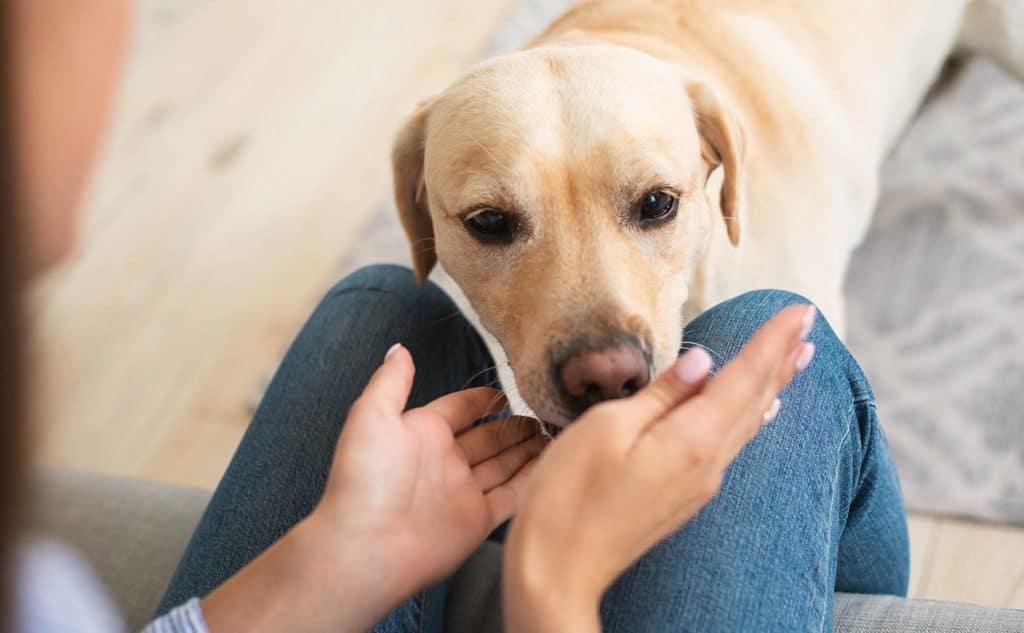Have you ever had an illeness and noticed your dog is being extra affectionate? Maybe you’re experiencing an upset stomach and you notice that your dog is spending more time by your side.
Imagine this: you’re finally getting cuddles from your beloved dog, and you’re having an amazing time until your dog starts to lick and paw at one spot on your head incessantly. Not long after, you feel a severe, throbbing pain or headache. But wait, isn’t that the exact spot your pup was just pawing and licking at a while ago?
If you notice this behavior, it’s not simply a coincidence. Your dog can tell when you are sick due to its out-of-this-world sense of smell. Dogs actually have several special ways they can tell when you’re not feeling the best!
When In Doubt, Sniff It Out
Dogs have an outstanding sense of smell. Some breeds have up to 40–50 times more scent receptors than humans. A dog’s nose has always been a powerful tool for them. Canines rely on their keen sense of smell for many different purpose, from hunting for food to sniffing out their favorite toys.
When a person is ill, or injured, there are chemical changes that take place in the body. Even without training, a dog’s sensitive snout may be able to detect these subtle changes in your scent before you even notice you are sick.
Dogs can be trained to sniff out VOCs or volatile organic compounds in the human body help detect illness. The dog’s nose can smell lung cancer on someone’s breath, pinpoint the location of a tumor, or even detect bladder and prostate cancer. Dog’s noses can alert us to blood sugar changes in someone with diabetes or the onset of a seizure in someone with epilepsy.
Dogs sense illness through these chemical changes in our bodies, and they have been able to for thousands of years.
So, if you notice your canine companion is paying more attention to a specific part of your body, you might want to listen. Your dog may be telling you something long before you even notice or feel the symptoms yourself.

Emotional Roller Coaster
Dogs pick up on more than just changes in scent. Dogs are acutely aware of human emotions. They notice the subtle changes in our facial expressions, the changes in our tone of voice, and when our energy levels fluctuate. Dogs can smell and sense the rise and fall of our feel-good hormones like oxytocin, dopamine, and serotonin. Your dog can sense when you are extremely happy, and it knows when you’re angry or unwell.
When we are sick, hormones like dopamine often plummet right along with our energy. Our dogs are often the first to notice these changes! Your dog will be able to sense your emotions and pick up on any of your facial cues, letting them know you are not okay. Dogs notice the changes in your face as well as any changes in your daily routine
When you cry, your dog may come up and lick your tears away. When you are sick, your dog may curl up beside you and not leave your side. Even the most subtle changes in your own emotions and behaviors can alert your dog to your current state.
How to React If Your Dog Senses You’re Sick
You do not need to train your dog to react to your behaviors. Your pet will pick up on these changes without any special prompting. It can sense your emotions, changes in your scent, and pick up your facial cues that show them you are not yourself. Your dog may seem a little calmer in your presence, be less demanding for playtimes and walks, and find ways to touch you at all times. It’s trying to comfort you, make you feel better, and lower your stress levels.
Accept your canine’s love and affection, and give your dog lots of love and belly rubs and treats. Show your pup how much you appreciate its caring. Your dog’s presence will make you feel better, no matter what is going on.
Featured Image Credit: Unsplash














